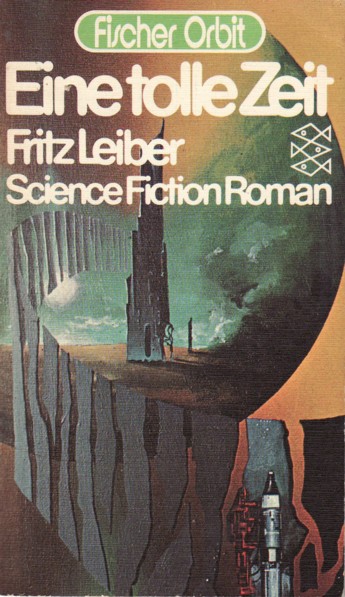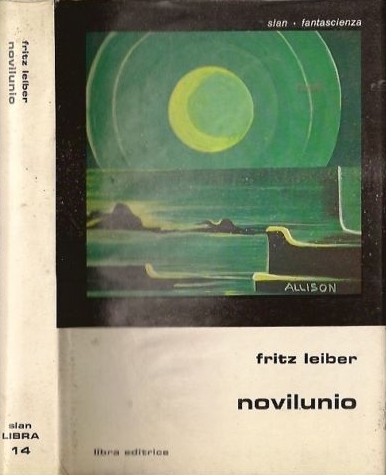By John Hertz: It’s the death-anniversary of Fritz Leiber (1910-1992). He wrote both fantasy and science fiction – all strange; if I may quote a Robert Louis Stevenson story, “Desire of strange things swept him on” (“The Isle of Voices”, 1893). Actually that’s not fair. I keep objecting when someone attributes what authors write to what they want. Leiber’s writing sweeps us on.
Two of my favorites among his science fiction are The Big Time (1958) and The Wanderer (1964). Both won Hugos.
Recently I hear people complaining when attitudes of characters in a story published in the past are other than what we’d aspire to now. I’m partly with this and partly not. I think the first look is at how authors treat their characters. A Filer said the other day I’d not call that book misogynistic. The character is, but the text clearly shows he’s an idiot. Then, as another Filer said, Of course it seems laughable to us now. Isn’t that a gratifying sign of how far we’ve come since then? There’s more, and Our Gracious Host has encouraged me to explore it, but I’m going to stop there for the moment.
We discussed The Big Time at Denvention III (66th Worldcon) in a set of SF Classics which I called “Wonders of 1958”. See this Eddie Jones cover of a German edition.

I wrote,
Spiders are the good guys, and our hero is a woman. The first Hero was a woman too, go look up Leander. Indeed this is a very classical book; it preserves the unities of time, place, and persons, which is mighty strange, considering. There’s slashing drama, and if you’ve never been a party girl, it might not be what you think.
We discussed The Wanderer at Renovation (which I always pronounce “Reno-vation”; 69th Worldcon). See this Allison cover of an Italian edition.

I wrote,
Here are a host of viewpoints, a first contact with aliens story as we learn a third of the way in, a look at some favorite notions like “Rovers are free and good” and “Love conquers all”, and a breathtaking exercise in climax and perspective.
May I recommend these two books to you?
Discover more from File 770
Subscribe to get the latest posts sent to your email.

Got Mittens. I don’t suppose the presence of the cover of a German edition of The Big Time here means that anybody here has read that translation, but I wonder how they handled maintaining the contrast between the English of the text and the occasional German that Leiber threw in.
Big Time is by far my favorite book by him. It’s also his work with the best audio versions that have been done and I’ve sampled all of them. The Helen Stainer narrated version is the one I have in my Audible library for listening to as it’s just her narrating the tale as opposed to the Suzanne Toren version that adds music (huh?). And there’s several older versions as well with the audio quality being somewhat shaky.
One of the fascinating things about Fritz Leiber — admission of bias: my favorite writer — is that, as the styles changed during his long writing career, the new writers would whoop and holler upon the land they’d just discovered, have a look around, and find that Fritz Leiber had been there a few years before.
I love both these books, rating The Big Time rather higher. The Wanderer feels a little more emotionally distant to me, probably because the large numbers of characters necessitated by the story Mr Leiber chose to tell prevented him from fleshing out any of the characters as fully as was his wont. But the glimpses we get of many of his characters (large numbers of whom do not survive the story) shows that they are all worthy of note.
The Big Time is a novel I have read a dozen or more times, always finding something I missed before. Like many others, I think that its staging would permit it to be performed live. To those who protest that such staging would relegate Greta, the story’s most fascinating character, to nothing more than an unimportant background figure, I suggest that problem could be solved by her character being portrayed by two actors. Dressed & styled identically, one Greta would be onstage with the others, while the other Greta would move about through the audience, serving as a one-woman roving Greek chorus and narrator. And, to show you what being a Spider does to people — at times, they would switch places. This would clearly demonstrate that they are two in one. Or one in two, however you wish to see it.
But The Big Time is a helluva fine read, and I think it’s time I got to it again. Along with its sequel, “No Great Magic.” Also a good-plus Leiber story.
The Big Time is my favorite of his novels. It obviously is a play for a theater in the round. The dialog crackles with energy. There’s nothing else like it in science fiction. I reread it recently to see if it had been moth-eaten by the suck fairy. Thankfully, it seems alright, but it’s a near thing. It helps to know that it was written during the height of the cold war. When the endless war is between the “spiders” and the “snakes”, the names make it clear there isn’t a good side. That’s a pretty bold thing to publish in 1958.
A close second favorite is Our Lady of Darkness. It is a greatly creative original fantasy that is deeply personal and humane but also quite scary. A no-doubt World Fantasy Award winner.
But then we get to the stories. Leiber could be evocative like no one else. When you read Smoke Ghost, A Pail of Air, Four Ghosts in Hamlet, Gonna Roll the Bones, and Ill Met in Lankhmar, you never forget the feeling.
Unfortunately, rereading Ill Met in Lankhmar in modern times, the story is marred by a fridging. Oh crap. It’s such a great story otherwise. I find myself now both loving and hating it. Some Fafhrd and Gray Mouser stories, such as Bazaar of the Bizarre are still gems. The main thing is read Leiber’s short fiction. His best work was stylistically head and shoulders above the rest of the field. Maybe it was because of his theater background.
Edited to add: The Big Time Brewery in the U District in Seattle is very good. Randy Byers worked nearby, and sometimes I could meet him there. Of course I’d bring a copy of Leiber’s book to read while I was waiting.
Tom Becker – Gotta agree with you regarding Ill-Met in Lankhmar. The death of the two women does mar the story. On the other hand, another story neither of us mentioned — Lean Times in Lankhmar — I regard as both a masterpiece of both comedy and heroic fantasy. And that is a rare daily double!
Glad somebody mentioned Leiber’s background in theater. That might just have been the reason he could write a novel that could readily be adapted to the stage. And yes, maybe it is time somebody did. He also worked in film, and some of his works have been adapted to film, but stage is a very different medium and I think he just might have had such an adaptation in mind.
And I do like the idea of two performers doing the one part, much as the protagonist of the opera of “The Handmaid’s Tale” is played by two people. I think that is a very sharp suggestion.
You have to mention “Coming Attraction “. Great story!